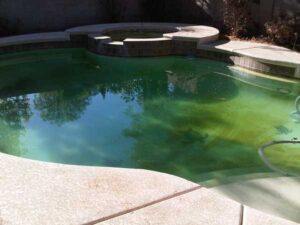Advanced Pool contractors, serving Memphis, TN explain types of algae
When summer is in full swing, the chance of your swimming pool becoming a victim to algae are increased. Even with diligent care the higher temperatures coupled with inconsistent sanitizer levels in the pool water, algae can take hold.
What is algae? It’s a single cell plant form that can make its own food through the power of the sun and it can grow and adapt in almost any swimming pool condition. Algae is microscopic and because of this you may not even notice an issue until millions of the cells have generated and given your pool a green tinge. Not to worry though, the swimming pool contractors from Advanced Pool Care can help you get the pool water back to swimming condition. The best form of ridding your pool of algae though is to diligently keep the pool clean and the water sanitized.
and adapt in almost any swimming pool condition. Algae is microscopic and because of this you may not even notice an issue until millions of the cells have generated and given your pool a green tinge. Not to worry though, the swimming pool contractors from Advanced Pool Care can help you get the pool water back to swimming condition. The best form of ridding your pool of algae though is to diligently keep the pool clean and the water sanitized.
There are three types of algae that can take hold in your pool and they are:
- Black algae. The name may be misleading because the algae is actually a dark-blue green. It begins growing in any cracks it can find in your pool’s surface that’s why it is found more often in concrete pools because of the rough surface it is an ideal breeding ground for this type of algae. If you have a shaded area in your pool, especially in a “deep end” this is an ideal spot for algae to begin growing. Be especially diligent in cleaning those areas. Black algae will look more like “moldy dark spots” on the pool and may not turn your water green. Algaecide, shocking and sanitizing will need to be part of the removal process but it is crucial that you brush the areas where the algae is clinging to thoroughly remove it.
- Green algae is the type found most often in a swimming pool. This type of algae may float in the water or it could cling to the walls. Your pool contractor can treat this type of algae by brushing, vacuuming, shocking and adding algaecide.
- Mustard algae will resist chlorine as it stubbornly clings to your swimming pool. It will look more like dirt than green algae and will form on the bottom of the pool.
Your pool contractor should be called if you see any of the issues involved with algae taking hold in your swimming pool. We hope it doesn’t happen to you and your pool, but rest assured an experienced swimming pool contractor can help rid your pool of this green, slimy issue.

